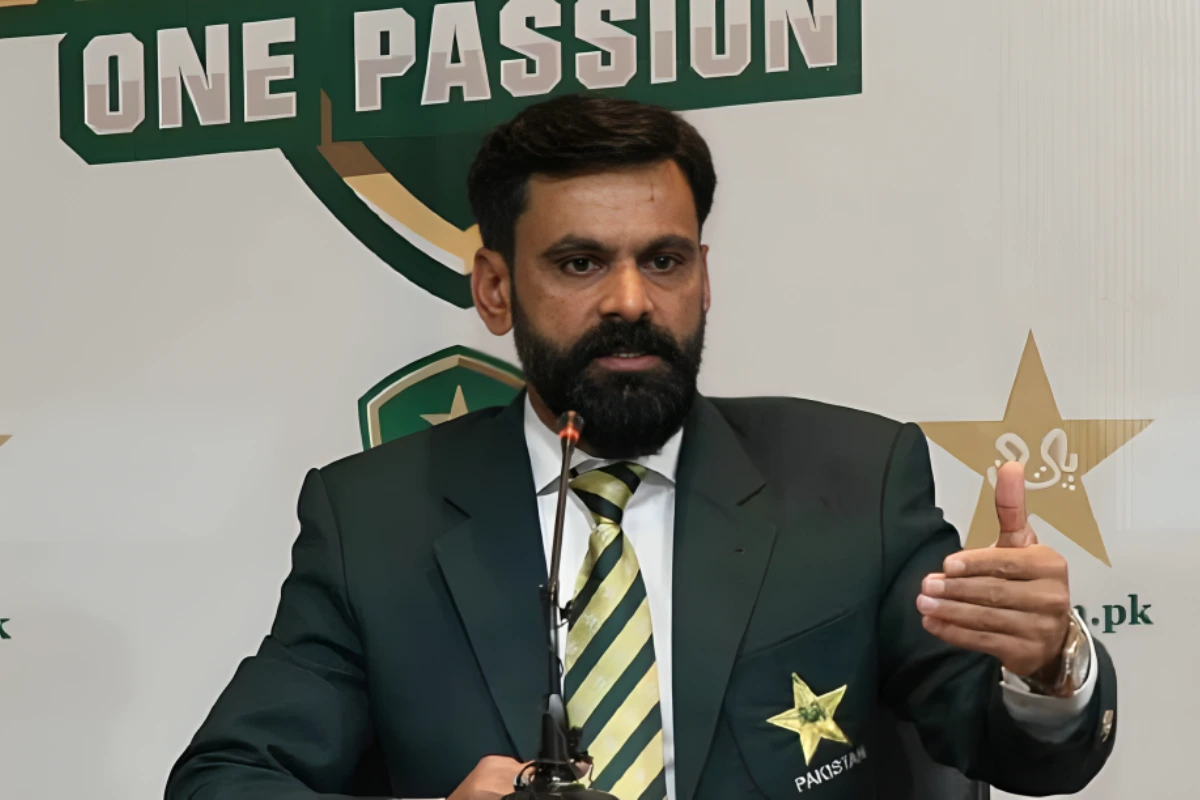Introduction 🌟
Pakistan cricket, once a powerhouse that produced legends like Imran Khan, Wasim Akram, and Inzamam-ul-Haq, is going through one of its most challenging phases. Recently, former captain Mohammad Hafeez openly criticized PCB Chairman Mohsin Naqvi, sparking debates about the governance and future of Pakistan cricket. His words have resonated deeply with fans and players, as they reflect the growing frustration with the decline of a team that was once feared worldwide.
Background of Mohammad Hafeez 🎓
Mohammad Hafeez, famously known as the “Professor” for his cricketing intellect, enjoyed a career spanning nearly two decades. He represented Pakistan in all formats, contributing with both bat and ball. After retirement, Hafeez stayed connected with the game, offering commentary, coaching insights, and occasionally serving as a mentor. His credibility comes not just from his experience but also from his ability to speak boldly about cricketing issues.

Who is Mohsin Naqvi? 🧑💼
Mohsin Naqvi, appointed as the current Chairman of the Pakistan Cricket Board (PCB), has a background primarily in politics and administration rather than cricket. His leadership has come under intense scrutiny as Pakistan’s cricketing fortunes continue to slide. Critics argue that having non-cricketing professionals in such pivotal roles has led to poor decisions and a lack of direction.
The State of Pakistan Cricket Today 📉
In recent years, Pakistan’s cricket has witnessed:
- A fall in ICC rankings across formats.
- Early exits from ICC tournaments.
- Lack of consistency in winning big matches.
This decline isn’t just about performance; it’s about management, strategy, and the absence of a long-term vision.
Hafeez’s Criticism Explained 🔍
Hafeez didn’t mince his words when he accused Mohsin Naqvi of being “clueless” about cricket management. He highlighted:
- Poor team selections.
- Inability to provide stability in leadership roles.
- Absence of a roadmap for developing future stars.
According to Hafeez, without proper cricketing brains in decision-making positions, Pakistan cricket will continue to suffer.
Selection Issues in the Team 🎯
One of the biggest complaints from Hafeez and fans alike is the constant chopping and changing of players and captains. In just a few years, Pakistan has had multiple captains across formats. This instability affects performance, confidence, and long-term planning.
Player Development Concerns 🚸
Grassroots cricket in Pakistan has always been fragile, but the current system has almost collapsed. Hafeez pointed out the lack of proper domestic tournaments, weak infrastructure, and poor investment in young talent. While other nations are producing polished players from their academies, Pakistan still relies on raw talent without proper grooming.
Management and Leadership Gaps 🏢
Leadership in PCB has often been reactionary rather than visionary. Hafeez argued that decisions are made under pressure from politics or public opinion instead of a strategic plan. This has resulted in:
- Mismanagement of resources.
- Poor scheduling and preparation.
- Unclear roles for coaches and support staff.
Impact on Player Morale 😞
Low morale has become a visible issue. Players look confused and insecure about their spots and divided in the dressing room. Dressing room politics have overshadowed team spirit, creating an environment where talent alone cannot thrive.
Comparison with Other Cricket Boards 🌍
When we look at India, Australia, or England, their boards run like professional organizations with stability in management, investment in academies, and strategic long-term goals. Pakistan, on the other hand, struggles with frequent changes in leadership and policies. Hafeez believes PCB must adopt a corporate model rather than a politically driven one.
Hafeez’s Call for Change 🔔
Hafeez has urged the PCB to bring in professionals with actual cricketing knowledge to lead decision-making. His suggestions include:
- Long-term contracts for players and captains.
- Revamping domestic cricket.
- Hiring competent coaches and managers.
- Minimizing political interference in cricket affairs.
Public Reaction to Hafeez’s Statement 📢
Fans took to social media to support Hafeez, with hashtags criticizing PCB leadership trending in Pakistan. Many expressed their disappointment with the current state of affairs, while some felt Hafeez should have been more constructive.
Media Coverage and Analysis 📰
The Pakistani media widely covered Hafeez’s remarks, with international outlets also highlighting the internal chaos in PCB. Cricket experts debated whether Hafeez’s blunt remarks would push the board toward reform or add more controversy.
The Future of Pakistan Cricket 🔮
Unless drastic steps are taken, Pakistan cricket risks falling further behind. Reforming domestic cricket, ensuring stable leadership, and building trust with players are essential. Hafeez’s criticism may be harsh, but it could be the wake-up call PCB needs to revive its glory days.
Conclusion & Final Thoughts 🏆
Mohammad Hafeez’s criticism of Mohsin Naqvi highlights a deep-rooted problem in Pakistan cricket—poor leadership and lack of vision. While Pakistan still produces raw talent, it requires proper management to shine on the international stage. If PCB heeds Hafeez’s advice and prioritizes cricket over politics, Pakistan can once again rise to the top of world cricket.
FAQs ❓
Q1. Why did Hafeez criticize Mohsin Naqvi?
Hafeez believes Naqvi lacks cricketing knowledge and has failed to provide direction for Pakistan cricket.
Q2. What are Pakistan cricket’s most significant challenges?
Inconsistent selection, weak domestic structure, poor management, and dressing room politics.
Q3. How are other cricket boards more successful?
They run professionally, invest in academies, maintain stability, and plan long-term strategies.
Q4. What steps should PCB take immediately?
Stabilize leadership, revamp domestic cricket, hire professional management, and support young talent.
Q5. Can Pakistan cricket bounce back soon?
Yes, but only with serious reforms, consistent policies, and professional decision-making at PCB.
